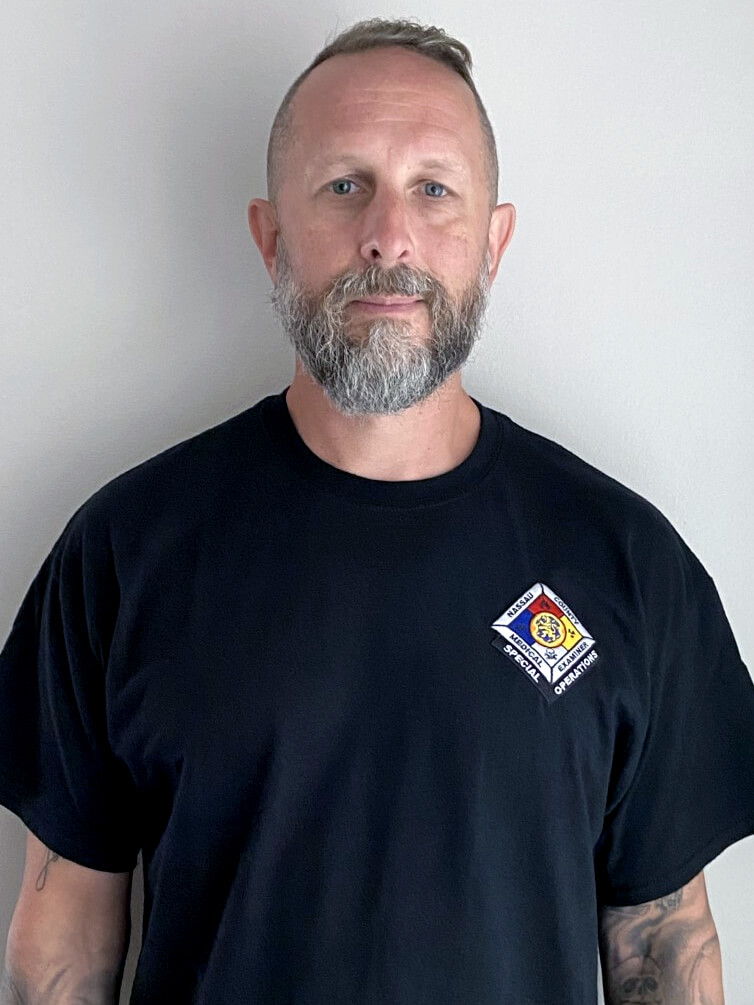
There are parts of Mike Vikara’s job that he can’t talk about with just anyone, and it’s not because he’s a government employee with top secret clearance or a mathematical physicist who deals with concepts few would understand. It’s because he works in a morgue.
Vikara is a forensic pathologist assistant for the Nassau County, New York, Medical Examiner, where he helps conduct external examinations of dead bodies and perform autopsies.
While most people would prefer not to think about death, Vikara and his colleagues embrace the subject. In doing so, they provide an essential public service to their community, offering crucial answers to end-of-life questions and peace of mind to a deceased person’s loved ones.
“We’re not out there in the public eye like emergency responders, and people tend not to think about what happens at the very end of life,” says Vikara, who is also a member of AFSCME CSEA Local 830. “We rarely get recognition like that, and we don’t mind. We’re not out there looking for any praise, we’re just there to help people, help families find answers and maybe some kind of closure.”
Despite their familiarity with life’s final stage, it would be wrong to assume that Vikara and his colleagues had an easier time coping with the fallout of the coronavirus. On the contrary, while the impact of the pandemic has spared almost no one and many have suffered devastating losses, few have experienced its human toll in quite the same way.
“As you’re doing your job, you don’t understand the impact that it’s having on you emotionally and mentally. You’re just focusing on getting the job done,” Vikara says. “But when you get home, you sit there and you think, ‘I can’t believe what I just saw today.’”
“I’ve been in the death care industry for 22 years, and this is nothing like what I could have imagined or prepared for,” he added. “I’d come home and just couldn’t believe how many dead bodies I’d seen in one day. It was so prolonged, day after day, it felt like it wasn’t going to end. This will last a lifetime in your memories. Hopefully, we’ll never see anything the likes of it again. It’s truly mind-boggling.”
On a normal day before the virus struck, the team at the medical examiner’s office would see between five and 15 dead bodies. But when the pandemic picked up speed back in the spring – with the New York City region becoming one of its epicenters – the numbers shot up.
“We wound up getting trailers in the back of the building because we didn’t have room for all the bodies,” Vikara recalls. “Our highest count was 222 bodies at one time.”
As Vikara confronted a situation he could never have foreseen, the one thing that didn’t change was his commitment to his job, his colleagues and the community he serves, according to Vikara’s colleague, Giorgio Mutino.
“There were so many deceased bodies coming in at any one time, and Mike was constantly there,” says Mutino, who is also president of the medical examiner’s unit of Local 830. “He has stepped up above and beyond what he needed to do.”
For his service to his community, Vikara is a winner of AFSCME’s Never Quit Service Award, which recognizes public service workers who go above and beyond the call of duty.
“I feel that what keeps me going is the fact that I love my job and am passionate about it,” Vikara says. “I’ve worked with a few people for many years and they are the greatest people in the world. If there’s anything that got you down, they’re there to pick you up. Some things you can’t talk about with someone who’s not involved in this field because they won’t understand it. But your colleagues are there with you every day.”
“I honestly love what I do,” he said. “If I had any choice to pick something different, I would pick this again.”
